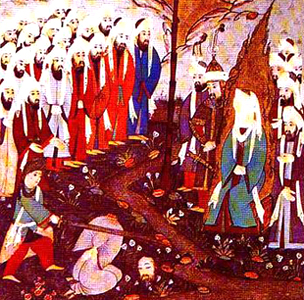Question: If women are captured in battle do you suppose those women a) would want to sleep with the soldiers who had presumably killed or captured their husbands/fathers/brothers b) would be in a position to refuse the advances of the soldiers?
Here's another question: What do we call having sex with a woman against her will?
When Muhammad's followers asked him about using coitus interruptus with women captured in battle, rather than taking the opportunity to give them a moral lesson in not forcing themselves on women (rape) or the inhumanity of slavery, or the moral degeneracy of having sex in such an unequal partnership, he simply told them ... to go ahead. We know this because it is reported in a sahih (utterly reliable) hadith (saying or action of Muhammad) as follows:
[From Muslim] @Book 8, Number 3373: Abu Sa'id al-Khudri (Allah be pleased with him) reported: We took women captives, and we wanted to do 'azl (coitus interruptus) with them. We then asked Allah's Messenger (may peace be upon him) about it, and he said to us: Verily you do it, verily you do it, verily you do it, but the soul which has to be born until the Day of judgement must be born.
Thus the person whom Muslims regard as the best human being God ever made seems utterly unconcerned about his followers raping women as part of the spoils of war. Not that we should be surprised, of course, because Muhammad's God shares His prophet's disregard for the right of slave women not to be raped, since we read this in the Qur'an, where Allah is at pains to teach the believers with whom they are are not allowed to have sex:
And forbidden to you are wedded wives of other people except those who have fallen in your hands (as prisoners of war) .4:24
and this, which lists in more detail the women with whom Muhammad himself can have sex. (Wasn't it good of God to make a special revelation telling humanity forevermore whom the Prophet could bonk?):
O Prophet! We have made lawful to thee thy wives to whom thou hast paid their dowers; and those whom thy right hand possesses out of the prisoners of war whom Allah has assigned to thee; and daughters of thy paternal uncles and aunts, and daughters of thy maternal uncles and aunts, who migrated (from Makka) with thee; and any believing woman who dedicates her soul to the Prophet if the Prophet wishes to wed her;- this only for thee, and not for the Believers (at large); We know what We have appointed for them as to their wives and the captives whom their right hands possess;- in order that there should be no difficulty for thee. And Allah is Oft- Forgiving, Most Merciful. 33:50
and this, which lists in more detail the women with whom Muhammad himself can have sex. (Wasn't it good of God to make a special revelation telling humanity forevermore whom the Prophet could bonk?):
O Prophet! We have made lawful to thee thy wives to whom thou hast paid their dowers; and those whom thy right hand possesses out of the prisoners of war whom Allah has assigned to thee; and daughters of thy paternal uncles and aunts, and daughters of thy maternal uncles and aunts, who migrated (from Makka) with thee; and any believing woman who dedicates her soul to the Prophet if the Prophet wishes to wed her;- this only for thee, and not for the Believers (at large); We know what We have appointed for them as to their wives and the captives whom their right hands possess;- in order that there should be no difficulty for thee. And Allah is Oft- Forgiving, Most Merciful. 33:50
If there is a God (which there isn't) are Muslims not slightly concerned that they may have to justify following such morally dubious teachings?
("Tell me, my son - why didn't you question such teachings? Didn't you think for yourself for just one moment? Didn't it occur to you ask why? Did you not suspect for one moment that it was all just...gibberish?")
Where is the goodness in such teachings? In what way can this be seen as the behavior of the best human ever?
Are those Muslims who use this and other similar reports to justify the appalling mistreatment of women in the world today better than those of us kaffirs who fight to highlight the injustice, moral depravity, and cruelty excused in the name of Islam?
Remember - according to Islam, ALL non-believers go to Hell and if you follow the teachings of Islam (such as those examined the above) you will go to Paradise.
Note: All Sunni (the majority, mainstream) Muslims MUST believe the reports of Muhammad's actions and words as recorded in the sahih (utterly trustworthy) ahadith. Hence all sunni Muslims have to believe that Muhammad thought it acceptable to have sex with slave girls and that all he was concerned with when asked about it was whether one should indulge in coitus interruptus when doing it.
"Best human ever" - hmmm.
Do any Muslims try to justify this? Well they try. Here's a typical example from sunniforum:
it seems that intercourse with slaves was probably considered a method of contraceptive sexual enjoyment through coitus interruptus (`azl), since the slave owner could practice `azl without prior permission from his slave mate while he could not do so with his free wife without prior permission from her. And if the contraception intended by this `azl failed and the slave woman still bore a child from her master, her child was automatically freed and obtained a son or daughter's rights including inheritance. In addition, the mother herself could no longer be sold and was freed upon the owner's death. From the slave's perspective, the above scenario could have formed an accepted kind of lawful gamble from which she stood to gain much more than to lose. This could be problematized with the claim that "the cost of freedom is therefore rape" but such is just an inflammatory rephrasing of the truism that the cost of a war captive's life is her imprisonment; emancipation from which is a dramatically enhanced possibility in the above scenario.
So that's all right then...rape is acceptable if it dramatically enhances the possibility of the victim gaining her freedom (by bearing the off-spring of her rapist).
And that's the best they can do?
(Thanks to Rational Islam? reader, Martin for the suggestion for this post)






